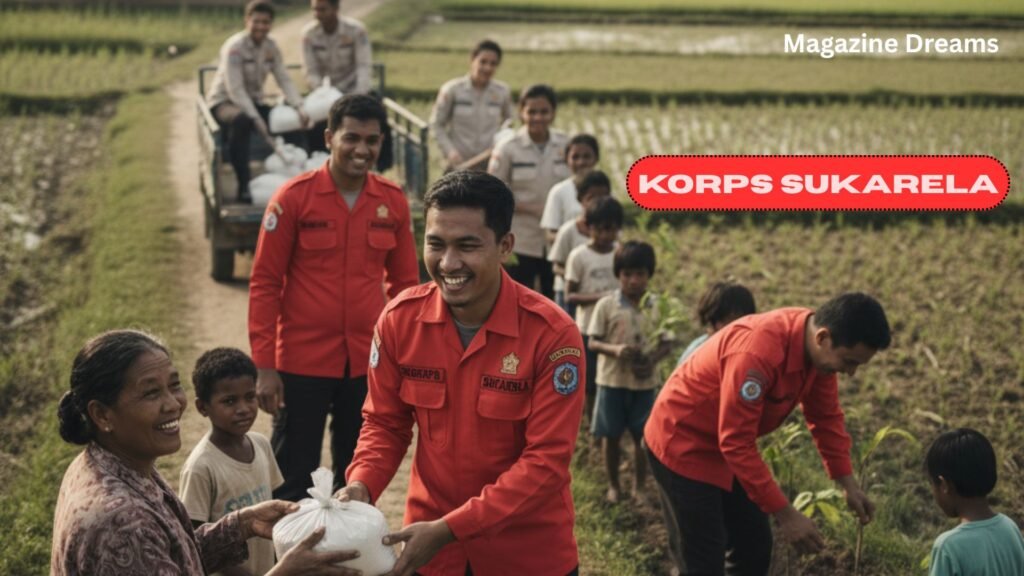When we talk about heroes, most people think of firefighters, doctors, soldiers, or teachers. But there’s another kind of hero that doesn’t always get the spotlight — those who give their time, energy, and heart… for free. We’re talking about Korps Sukarela, a volunteer corps that represents something truly powerful: the spirit of humanity in action.
Volunteering might sound simple, but behind it is a movement that touches millions of lives. It’s not just about helping others — it’s about building something bigger than yourself. Let’s dig deep into what Korps Sukarela really means, how it works, why it matters so much, and how it’s shaping communities today.
🌍 What Is Korps Sukarela?
Literally, Korps Sukarela translates to “Volunteer Corps”. It’s a group of people — sometimes organized, sometimes informal — who dedicate their time and skills to serve others without expecting payment.
Sounds noble, right? Because it is.
But there’s more. These corps aren’t limited to one country or one cause. They can be found in schools, disaster relief organizations, hospitals, and even environmental groups. Whether it’s helping during floods, organizing blood donations, teaching underprivileged children, or supporting the elderly — that’s korps sukarela in action.
And if you’ve ever wondered what makes them tick… it’s not money. It’s purpose.
Visit Korps Sukarela to see stories and insights about modern volunteer movements.
💪 The Power Behind Volunteering
Why do people join korps sukarela?
It’s not always easy to explain. Some join because they’ve lived through hardship and want to give back. Some simply love the feeling of making someone smile. Others are driven by faith, empathy, or even curiosity.
Here’s what volunteering does — both for the helper and the helped:
| Impact Area | Effect on the Volunteer | Effect on the Community |
|---|---|---|
| Emotional Health | Builds happiness and reduces loneliness | Provides emotional support and hope |
| Skill Development | Improves leadership, teamwork, and communication | Increases community efficiency |
| Social Connection | Expands social circles and friendships | Strengthens unity and understanding |
| Moral & Ethical Growth | Creates gratitude and humility | Promotes a culture of kindness |
When you look at it this way, volunteering isn’t charity — it’s mutual growth. Everyone gains something.
🫶 Types of Korps Sukarela Around the World
There isn’t just one type of volunteer corps. In fact, these groups can look very different depending on the country, community, or even cause. Let’s go through a few major types:
1. Disaster Response Teams
When an earthquake hits or floods destroy homes, these are the first people on the ground. They don’t wait for government orders — they act. Trained in emergency aid, evacuation, and first response, they often save lives before official rescue units arrive.
2. Health & Blood Donation Volunteers
These groups organize blood drives, health camps, and vaccination awareness campaigns. They’re the bridge between the medical system and the people who need it most.
3. Environmental Volunteers
From beach clean-ups to tree planting and recycling drives — these volunteers fight for the planet, one action at a time.
4. Educational & Social Volunteers
Teaching children in slums, mentoring youth, visiting orphanages — these activities might look small, but they transform generations.
5. Cultural & Event Volunteers
Ever been to a marathon, festival, or charity concert? Those friendly faces managing crowds and offering water bottles — yes, korps sukarela again.
🧠 What Makes a Good Volunteer?
Not everyone who signs up for korps sukarela stays. Why? Because volunteering takes heart, patience, and sometimes… sacrifice. Here are a few qualities that define a true volunteer spirit:
- Empathy: Feeling others’ struggles like your own.
- Commitment: Showing up even when it’s not easy.
- Teamwork: Putting aside ego for the greater good.
- Humility: Helping quietly, without expecting credit.
- Creativity: Finding ways to solve problems fast.
And sometimes, it’s not about perfection. Even small help — carrying boxes, smiling at a tired nurse, listening to someone vent — matters more than you think.
🕰️ A Little History of Korps Sukarela
Volunteering isn’t new. It’s as old as humanity itself.
In Indonesia, Malaysia, and many other Asian countries, korps sukarela became organized after natural disasters and wars. Communities needed quick, self-organized response groups when governments were overwhelmed. Out of that necessity came structured volunteer units — sometimes under Red Cross branches, sometimes within youth or community organizations.
Through the decades, these corps became part of national pride. In some regions, being part of korps sukarela even became a badge of honor — a symbol of selfless service and courage.
Today, they’ve gone digital. Social media helps them mobilize faster, collect donations, and spread awareness. What used to take days now takes minutes.
💬 Real-Life Stories That Inspire
Let’s make it real. Numbers and titles are nice, but stories — they hit differently.
- Rafi, a student in Jakarta, joined korps sukarela after a major flood hit his neighborhood. “At first, I just wanted to help my neighbors,” he said. “But then I realized… this isn’t just helping others. It’s healing yourself too.”
- Aisha, a nurse, volunteered to teach first aid to teenagers. Her reason? “So when disaster strikes, we’re not helpless. Knowledge is also a kind of rescue.”
- Dimas, a tech guy, helped create an app for volunteer coordination. No uniform, no fieldwork — but his digital skills made hundreds of rescues possible.
And that’s the beauty of it — everyone can contribute in their own way.
🎯 Why Society Needs Korps Sukarela
Let’s face it. No government, no matter how rich or efficient, can handle every crisis perfectly. There are gaps — and volunteers fill them.
Here’s why korps sukarela is essential:
- They act faster – Volunteers are often the first responders.
- They reach deeper – Into rural areas and small communities where official aid rarely goes.
- They inspire others – Good deeds spread like wildfire.
- They reduce costs – Many projects would never happen without free manpower.
- They build trust – Between people, institutions, and communities.
So yeah, they’re not just “helpers.” They’re the social glue holding everything together.
🔧 How to Join Korps Sukarela
Thinking of joining? That’s awesome. You don’t need superpowers — just the willingness to show up.
Here’s how you can start:
- Find a Local Group
Check schools, Red Cross chapters, mosques, churches, or community centers. - Pick a Cause You Care About
Disaster relief? Education? Environment? Find what speaks to you. - Attend a Training or Orientation
Learn first aid, basic safety, or teamwork skills. - Be Consistent
Volunteering once is great, but long-term impact comes from regular effort. - Share Your Experience
Encourage others by posting about your work (without showing off). Inspiration matters.
You can explore opportunities and inspiring stories at Korps Sukarela.
📊 Benefits of Being Part of a Volunteer Corps
Volunteering may sound like giving, but you receive more than you can imagine. Let’s break it down — practically and emotionally.
| Personal Benefits | Professional Benefits | Social Benefits |
|---|---|---|
| Boosts self-esteem and happiness | Improves resume & networking | Strengthens community ties |
| Reduces stress and anxiety | Develops leadership & soft skills | Promotes unity and trust |
| Teaches gratitude & empathy | Opens new opportunities | Encourages civic responsibility |
It’s not just “good for others.” It’s a way of becoming the best version of yourself.
🌱 Challenges They Face
Of course, it’s not always rosy. Korps sukarela members face real struggles — sometimes life-threatening ones.
- Lack of funding – Volunteers often use their own money.
- Emotional burnout – Seeing pain daily can be draining.
- Limited recognition – Many are never acknowledged publicly.
- Coordination issues – During big crises, chaos can slow them down.
- Safety risks – Especially during disasters or disease outbreaks.
And yet… they keep showing up. Why? Because someone has to.
🧩 How Technology is Changing Volunteerism
The digital age has completely changed how korps sukarela operate. Gone are the days when they relied only on phone calls and posters. Now, tech connects thousands instantly.
- Social Media helps spread alerts and collect donations fast.
- Mobile Apps coordinate rescue teams in real-time.
- Online Training lets people learn first aid or disaster management from home.
- Virtual Volunteering — people now help with design, fundraising, and awareness online.
Technology hasn’t replaced the human touch — it’s amplified it.
❤️ Volunteerism During Crisis: The COVID-19 Example
Remember the pandemic? When fear and confusion ruled the world, volunteers didn’t hide — they acted.
While many were locked indoors, korps sukarela groups delivered food, masks, and medicine to those who couldn’t move. Some risked infection daily to keep their communities alive.
And even beyond COVID, they’re always there — during fires, floods, or economic crises. Quietly doing the work that keeps the world humane.
🕊️ The Emotional Side: Why It Feels So Good to Give
Let’s be honest — helping others just feels good. There’s science behind that. Acts of kindness release endorphins and serotonin — the same chemicals linked to happiness.
But it’s more than brain chemistry. When you volunteer, you see life up close. You realize that happiness isn’t about money or success — it’s about connection.
And sometimes, in helping someone else stand, you find your own balance again.
🧭 The Future of Korps Sukarela
The world’s changing fast — climate change, economic instability, global migrations — all need people who care.
In the coming years, korps sukarela will likely evolve into more organized, tech-driven networks. They’ll collaborate across countries, share data, and train online. Maybe even use AI for coordination (but not to replace the human heart, never that).
Still, at its core, the movement will remain human — compassion-driven, hands-on, and deeply emotional.
🪶 Quick Recap — Why Korps Sukarela Matters
Let’s summarize what makes this movement so important:
- Helps people in need — fast and effectively.
- Strengthens community bonds.
- Builds empathy and leadership in volunteers.
- Fills gaps where governments can’t reach.
- Keeps hope alive in dark times.
That’s a lot of good packed into one phrase — korps sukarela.
🌤️ A Final Thought…
We live in a world obsessed with rewards — salaries, fame, likes, followers. But there’s another kind of reward that can’t be measured: the quiet joy of doing something good, expecting nothing back.
Maybe that’s why korps sukarela members smile differently. They’ve discovered something simple, yet profound — that giving doesn’t empty you. It fills you.
So, next time you see someone in a volunteer uniform, remember: they might not have superpowers, but they’re making the world better, one small act at a time.
And maybe — just maybe — it’s time for all of us to wear that invisible badge of kindness.



